ごほっごほっごほっごほっごほっげほごほがほげほ、ごほ。
ホント? よかった!!(じゅ)
良かったじゃねえよ、良かったじゃ。当たり前だっつうの。台湾独立派の集会に行って法輪功の集会にも行ったワタシはどうなる(でも保釣行動委員会の日本総領事館デモにも行ってたりする) 資料だって山ほど持ってるよーーーだ。
(それより中共暴露モノの方が多いが)
本日「国家分裂罪で終身刑!?」とオソれオノノく市民の皆様に、ホーキ頭ことレジーナ・イップ(葉劉淑儀)保安局長が「心配しないでくださいっ」とばかりに上記の回答。だーかーらーアンタらに「心配しないでね」っつわれると、余計シンパイになるからヤメテ。
...しかし「当たり前だ」とは言え、大陸では当たり前ではナイ。どの程度で捕まるのかよく知らんが。とにかく香港に観光に来て、ホンハム駅前で法輪功学員が配ってたパンフ持って帰っただけでもヤバいらしい(見つかれば)
ホント? よかった!!(じゅ)
良かったじゃねえよ、良かったじゃ。当たり前だっつうの。台湾独立派の集会に行って法輪功の集会にも行ったワタシはどうなる(でも保釣行動委員会の日本総領事館デモにも行ってたりする) 資料だって山ほど持ってるよーーーだ。
(それより中共暴露モノの方が多いが)
本日「国家分裂罪で終身刑!?」とオソれオノノく市民の皆様に、ホーキ頭ことレジーナ・イップ(葉劉淑儀)保安局長が「心配しないでくださいっ」とばかりに上記の回答。だーかーらーアンタらに「心配しないでね」っつわれると、余計シンパイになるからヤメテ。
...しかし「当たり前だ」とは言え、大陸では当たり前ではナイ。どの程度で捕まるのかよく知らんが。とにかく香港に観光に来て、ホンハム駅前で法輪功学員が配ってたパンフ持って帰っただけでもヤバいらしい(見つかれば)










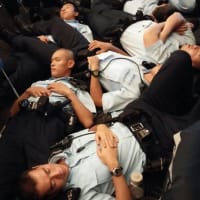

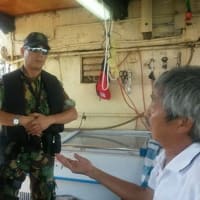
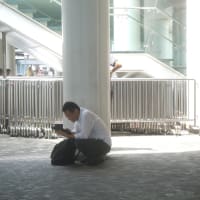
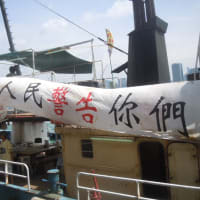




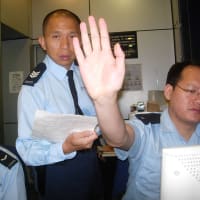
李登輝の尖閣の話、24日に沖縄タイムスみたんですが、ウェブ版には記事がなかったんスよね。昨日の産経朝刊が割と詳しいです。(朝ヤムその他の記事参照)
>> 尖沙咀碼頭でもらった法輪功のビラとCDを所持しているわたしもヤバイ。
ヤバイです(笑)法輪功の場合、ブラックリスト入りするとチューゴク以外の国への入国にも差し支えます(脅し)
...でも香港人またチョーシに乗って
「これはどーだ!」
「これならどーだ!」
「ここまでいっちゃうぞ!」
ト、限界に挑戦してネタにし、笑いを取りそうでコワい。
(基本的にワタシと変わらないが)
しかし。マジメな話。所持、携帯など、市民が持ってる事については実際に問題ないでしょうが、それを「作る」方の「自主規制」の加速は、非常に懸念される。例えばSybaris氏の愛する香港名物・不謹慎本(政治系)出版が、この先いっそう少なくなるんじゃないでしょうか。
昨日もどっかの新聞がウマいこと書いてましたが「いつ地雷を踏むかわからない」、実際に大陸で拘束された外国籍の学者たちも、何が容疑に該当したのかわからないという。
While open government and a high degree of transparency of government actions encourages participation in public affairs and enhances accountability, some information has, of necessity, to be kept confidential to protect the security of the country and the people, and to ensure the smooth running of government. There should therefore be legal sanctions against unauthorised access or disclosure of such information. At the same time, in order to safeguard freedom of expression and information, protection should only be afforded to truly deserving categories of information, and the means of protection should be clearly defined. We propose to retain the stipulations of the existing Official Secrets Ordinance, specifying that the targets of protection against the theft of state secrets should be (a) where spying is concerned, information which is likely to be useful to an enemy, and whose obtaining or disclosure is for a purpose prejudicial to the safety or interests of the PRC or the HKSAR; (b) where unlawful disclosure is involved, information belonging to the following categories (i) security and intelligence information; (ii) defence information; (iii) information relating to international relations; (iv) information relating to relations between the central authorities of the PRC and the HKSAR; and (v) information relating to commission of offences and criminal investigations.
''Spying'', which generally refers to the procurement of information useful to a foreign power and prejudicial to state security, is regarded worldwide as a serious national security offence meriting heavy punishment. In contrast, in order to preserve the balance between protecting state security and promoting open government, it is considered that unauthorised disclosure of official information should only be criminalised where the information is of a sensitive nature.
The Official Secrets Ordinance already provides a good foundation for protecting state secrets. Nonetheless, we propose to introduce a new offence of unauthorised and damaging disclosure of protected information obtained by unauthorised access.
Foreign political organisations(外国の政治組織)
The existing provisions in the Societies Ordinance are sufficient to prohibit foreign political organisations from unduly influencing the local political process, and should be retained. On the other hand, political activities that pose genuine threats to national security are likely to be organised. Prohibition of such threatening political activities can be achieved to a large extent under the existing Societies Ordinance, which enables the Secretary for Security to declare an organisation within the HKSAR unlawful where this is necessary on national security grounds.
To thwart organisation of such activities that would genuinely endanger the state, it is proposed that an organisation that endangers state security could be proscribed, but only where necessary under the standards of the ICCPR to protect national security, public safety and public order, and where one of the following circumstances exists - (a) the objective, or one of the objectives, of the organisation is to engage in any act of treason, secession, sedition, subversion, or spying; or (b) the organisation has committed or attempts to commit any act of treason, secession, sedition, subversion, or spying; or (c) the organisation is affiliated with a mainland organisation which has been proscribed in the mainland by the central authorities in accordance with national law on the ground that it endangers national security.
We propose to make it an offence to organise or support the activities of proscribed organisations, or to manage or to act as an office-bearer for these organisations. An organisation which has a connection with a proscribed organisation might also be declared as unlawful where necessary under the standards of the ICCPR.
The decision to proscribe and to declare an organisation unlawful would be subject to an appeal procedure. To ensure fairness, this procedure should involve two levels. First, points of fact may be appealed to an independent tribunal. Secondly, points of law may be appealed to the court.
Others(その他)
It is necessary to ensure that sufficient account is taken of the possible implications of technological developments and the vastly increased ease of communications on extra-territorial acts. Very broadly, we propose to claim jurisdiction over an offence only where a sufficient nexus with the HKSAR is present, i.e. either the act is committed by a HKSAR permanent resident overseas, or the act has a specified ''link'' with the HKSAR.
Effective investigation powers are required to deal with threats to the security or interests of the state or the HKSAR. We propose to provide enhanced powers for dealing with the more serious of the Article 23 offences.
Issued by the SAR Security Bureau, September 24 2002.
While it is universally accepted that the freedom of expression, in particular the right to voice dissenting opinions, is a fundamental right in modern democratic societies, the International Covenant on Civil and Political Rights (ICCPR) specifically provides that the freedom of expression is not absolute and carries special duties and responsibilities. It is also widely recognised that the fundamental national security interests and stability of the state may sometimes be seriously endangered by verbal or written communications, including those conveyed electronically. Examples would include a speech inciting others to commit an offence endangering national security. For this reason, the freedom of expression may, under the ICCPR, be restricted on certain specified grounds, such as national security. Many jurisdictions, including the most liberal and democratic societies, retain sedition as a serious criminal offence. There is therefore a continued need for sedition offences to protect the state and key institutions from stability-threatening communications.
We propose to narrow the existing offence of sedition so that it is an offence (a) to incite others to commit the substantive offences of treason, secession or subversion; or (b) to incite others to violence or public disorder that seriously endangers the stability of the state or the HKSAR.
While the sedition offence should cover one aspect of communications threatening the security and stability of the state, there is also a need to deal with seditious publications. However, offences targeting publications are a direct restriction on the freedom of expression, and should therefore be narrowly defined in order to comply with the necessity and proportionality criteria as required under the ICCPR. If the act of dealing with seditious publications is part of an act of incitement, it may be covered by the offence proposed above. However, if someone deals with seditious publications for some other reasons, such as profit, while at the same time being fully aware that the publications would incite offences that endanger national security, such dealings should also be suitably regarded as criminal acts.
We propose to narrow the existing definition of ''seditious publication''. A publication should be regarded as seditious only if it would incite persons to commit the substantive treason, secession and subversion offences, and that it would be an offence, with knowledge or reasonable suspicion that a publication is seditious, (a) to deal with that publication without reasonable excuse; or (b) to possess that publication without reasonable excuse.
The mere expression of views, or mere reports or commentaries on views or acts, will not be criminalised, unless such expressions, reports or commentaries incite others to achieve a specified purpose through levying war, force, threat of force, or serious unlawful means. This is in compliance with Article 39 of the Basic Law, which enshrines protection of the freedom of expression.
Subversion(政府転覆)
In the context of the protection of state institutions, subversion is commonly understood to involve overthrowing or undermining the constitution, the constitutionally established government, or system of government by internal or domestic elements. There is no specific offence of ''subversion'' in the laws of the HKSAR, although the violent overthrow of the government is covered by the existing treason offence of ''levying war to depose the sovereign''.
The targets of protection against subversion should be the basic system of the state and the PRCG. We propose to define the offence of subversion as (a) to intimidate the PRCG; or (b) to overthrow the PRCG, or to disestablish the basic system of the state as established by the PRC constitution, by levying war, or by force, threat of force, or by other serious unlawful means. The related inchoate and accomplice offences of attempting, aiding and abetting, counselling and procuring the commission of substantive offences, and conspiring to commit the substantive offences, are also proposed to be codified.
【英語版】
Consultation Document on Proposals to Implement Article 23 of the Basic Law
http://www.info.gov.hk/sb/eng/report/reporte.pdf
【中国語版】
實施基本法第二十三條諮詢文件
http://www.info.gov.hk/sb/chi/report/reportc.pdf
ナンですが、PDFファイルの上にどエラい長いので
今日のSouth China Morning Postよりコチラを:
(New laws may undermine freedoms より)
Treason(反逆)
Treason means the betrayal of one's country. The interests to be protected against treason are the sovereignty, territorial integrity and security of the People's Republic of China (PRC) as a whole, and the PRC government (PRCG). Treason offences under the Criminal Law of the PRC refer to those acts endangering the sovereignty, territorial integrity and security of the PRC committed by a PRC citizen in collusion with a foreign state, or with an organisation or individual outside the territory of the PRC. Treason offences are essentially crimes of endangering state security from without and the legal interest to be protected is the external status of the country.
Having studied the existing offence of treason, the Criminal Law of the PRC and the relevant provisions in other jurisdictions, We propose to update and improve the treason provisions in Part I of the Crimes Ordinance by restricting the substantive offences to:
(a) levying war by joining forces with a foreigner to (i) overturn the PRCG; or (ii) compel the PRCG to change its policy or measures by force or constraint; or (iii) put any force or constraint upon the PRCG; or (iv) intimidate or overawe the PRCG; or, (b) instigating a foreigner to invade the PRC; or, (c) assisting by any means a public enemy at war with the PRC.
We also propose to codify the common law inchoate and accomplice offences of attempting, aiding and abetting, counselling and procuring the commission of substantive offences, and conspiring to commit the substantive offences; and also the offence of misprision of treason (i.e. failure to report a known offence of treason). The current treasonable offences and offence of assaults on the sovereign are proposed to be repealed.
Secession(国家分裂)
Preserving the territorial integrity and unity of a nation lies at the heart of the welfare of a nation. A breach of that integrity by force or other serious unlawful means will, almost invariably, lead to war. There is at present no offence termed ''secession'' in the HKSAR. To ensure the protection of territorial integrity and unity of our country, we propose to create a specific offence of secession, making it an offence to (a) withdraw a part of the PRC from its sovereignty; or (b) resist the Central People's Government (CPG) in its exercise of sovereignty over a part of the PRC by levying war, or by force, threat of force, or other serious unlawful means. The specific inchoate and accomplice offences of attempting, aiding and abetting, counselling and procuring the commission of the substantive secession offence, and conspiring to commit the substantive offence, are also proposed.